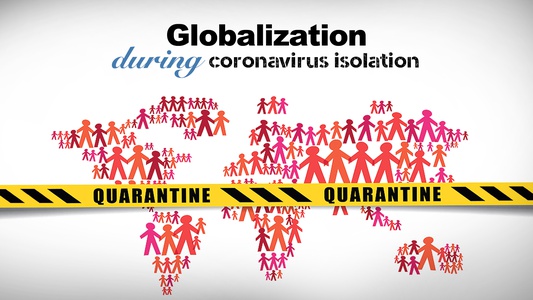

COVID-19 and the Future of Globalization
April 18, 2020, 11:13 a.m.Coronavirus has emerged as an epidemic, which is tirelessly trying to cover countries like Japan, Italy, Europe and America, including China and East Asia. In view of the outbreak of coronavirus, the WHO has declared the world an "epidemic" and has moved the world into a crisis.
The emergence of a liberal international system has been a major factor in the increasing movement of people across borders, whether aimed at supply chains and distribution networks, international finance and the flow of money, employment, studies or tourism. But this globalization has allowed the entire world to become more aware of the spread of coronovirus, and it may eventually be a powerful force for its own
The coin of globalization has two aspects. On the positive side, cross-border flow of people, goods, money and information creates new wealth and opportunities. On the downside, however, it can increase global inequalities, enable international terrorism and cross-border crime, and allow for the rapid spread of the disease.
We saw this latter effect with the SARS outbreak in 2003, but compared to the beginning of this century, people's cross-border movement has increased dramatically, and the pace of spread of this novel coronavirus has a completely different The order has been
Countries around the world are now responding by prohibiting the movement of people, especially in the coronovirus countries requiring a ban on people's entry or for some time self-quarantine to inner travelers. Of course, once the epidemic subsides, these restrictions will certainly be lifted. But with this new awareness of the risks associated with the free movement of people, there are some who can avoid future life, business or leisure plans that require crossing the border.
In particular, the coronovirus epidemic is having devastating effects for corporations and businesses, which have benefited from economic dependence supported by cross-border supply chains. China is the world's largest production base, and lies at the heart of many supply chains. Since the outbreak of this coronavirus, many companies that came to depend on China were hard hit. Meanwhile, the tourist areas of Japan and several other countries have profited from the large influx of Chinese tourists in recent years, which have been severely affected by reducing the number of inbound. The challenge for manufacturing and tourism industries in many countries is to determine to what extent dependence on China and the Chinese people can be reduced.
In fact, the need may extend beyond China. From the perspective of risk analysis, we can see very little in favor of domestic facilities growing very rapidly from scattered production bases globally. Of course, it is unlikely that the tourism industry will stop looking at international arrivals. But many in the industry may have to start working on initiatives to increase domestic demand.
Not surprisingly, the COVID-19 epidemic is already at play in today's nationalist narratives. For some Americans, the Chinese origin of the disease will simply confirm the belief that China is a threat to the world and cannot be trusted to behave responsibly. At the same time, many Chinese will likely see some American measures to combat the virus, with the intention of being racially motivated and blocking the rise of China. There are already conspiracy theories about the virus making by the US Central Intelligence Agency. In a world full of disintegration, COVID-19 promises to bring even more.
As the Dutch historian Johann Huizinga showed, the period following the Black Death in Europe came to be as "the fall of the Middle Ages". For him, the real story was not just after the economic consequences of an epidemic, but because of the mysticism, irrationality and xenophobia that eventually brought an end to a universal culture. Likewise, it is entirely possible that COVID-19 will supersede the "wandering of globalization".
Got another minute? Check out:


COVID-19 & Data-enabled healthcare initiatives

COVID-19 and digitalisation: 4 areas of tech set to boom post-pandemic

What COVID-19 Means for Ecommerce Startups


5 Ways Blockchain Tech Can Help Us During This Pandemic

Business Implications of Covid-19.

Businesses to survive the Covid-19 crisis

How will blockchain technology help to reduce the damage due to COVID-19.

Is COVID-19 be the best time of startup. Is it really?
